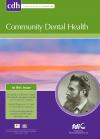Community Dental Health

- Cover Date:
- September 2008
- Print ISSN:
- 0265 539X
- Vol:
- 25
- Issue:
- 3
Caries prevalence in 2-year-old children in the city of Zurich
Objectives To establish caries prevalence in 2-year-olds in the city of Zurich; and to investigate the relationship between caries prevalence and dietary habits, and oral hygiene practices in native children and children with immigrant background. Method 1,000 randomly selected 2-year-olds were invited to participate in a clinical examination, at which parents were interviewed about the child’s oral hygiene and dietary habits. Caries diagnosis was based on visual inspection of all tooth surfaces and included both initial (d1) and cavitated (d2) lesions. Univariate and multivariate logistic regressions for two subgroups of children (children of Swiss and foreign-born mothers) were performed in order to assess the association between predictor variables and caries. Results 771 children were examined (participation rate 78%; mean age 2.4 years (age range 2.06 - 2.90 years)). Although the majority (94%) was born in Switzerland, 61% of children had immigrant backgrounds (mother not born in Switzerland). Cavitated teeth (d2mft) were observed in 12.6% of children (95% CI: 10.4 -15.1%). Caries including initial lesions (d12mft) affected 25.3% of children (95% CI: 22.4 - 28.5%). There were 34 (4.4%) children with severe caries (all maxillary incisors cavitated). For children with caries, the mean d2mft was 4.3 (± 2.8). Children with foreign-born mothers (mothers not born in Switzerland) exhibited a significantly higher caries prevalence than those with Swiss-born mothers (17.4% versus 5.0% with d2mft>0). Conclusions Children with foreign-born mothers exhibited significantly higher caries prevalence rates than those with Swiss-born mothers. Poor oral hygiene and night-time bottle use were identified as risk indicators for caries in all children. Further risk indicators identified in children of foreign-born mothers were a preference for sugar-containing non-milk drinks, no pacifier use, child’s age and male gender.
Key words: Caries prevalence, early childhood caries, risk indicators
- Article Price
- £15.00
- Institution Article Price
- £
- Page Start
- 154
- Page End
- 160
- Authors
- G. Menghini, M. Steiner, E. Thomet, M. Roos, T. Imfeld
Articles from this issue
- Title
- Pg. Start
- Pg. End
- Comparison of two methods in deriving a short version of oral health-related quality of life measure.
- 132
- 136
- The presenting complaints of low income adults for emergency dental care: An analysis of 35,000 episodes in Victoria, Australia.
- 143
- 147
- Cariogenic and erosive potential of the medication used by HIV-infected children: pH and sugar concentration
- 170
- 172
- Enamel fluorosis in 12- and 15-year-old school children in Costa Rica. Results of a National Survey, 1999
- 178
- 184
- Short Communication - Fissure sealants on permanent first molars – consequences of a one-year delay
- 191
- 192
